A Socio-Political Examination of European Identity and its Challenges
VerifiedAdded on 2022/11/17
|18
|5279
|291
Essay
AI Summary
This paper provides a comprehensive socio-political analysis of European identity, tracing its historical roots from the Neolithic era through the rise and fall of civilizations, the impact of major historical events like the Industrial and French Revolutions, and the two World Wars. It examines the emergence of European institutions and their roles, followed by a detailed exploration of the challenges and crisis facing European identity, including issues of diversity, discrimination, the impact of wars, and the refugee problem. The paper delves into the concepts of personal and collective identity, and national identity and discusses the strengths and weaknesses of European culture. The paper concludes by proposing solutions such as modifications to the educational system, restructuring the political condition, and bringing alteration into integrity that can be helpful to bring back and regain the positivity and unravel the concern of identity crisis.
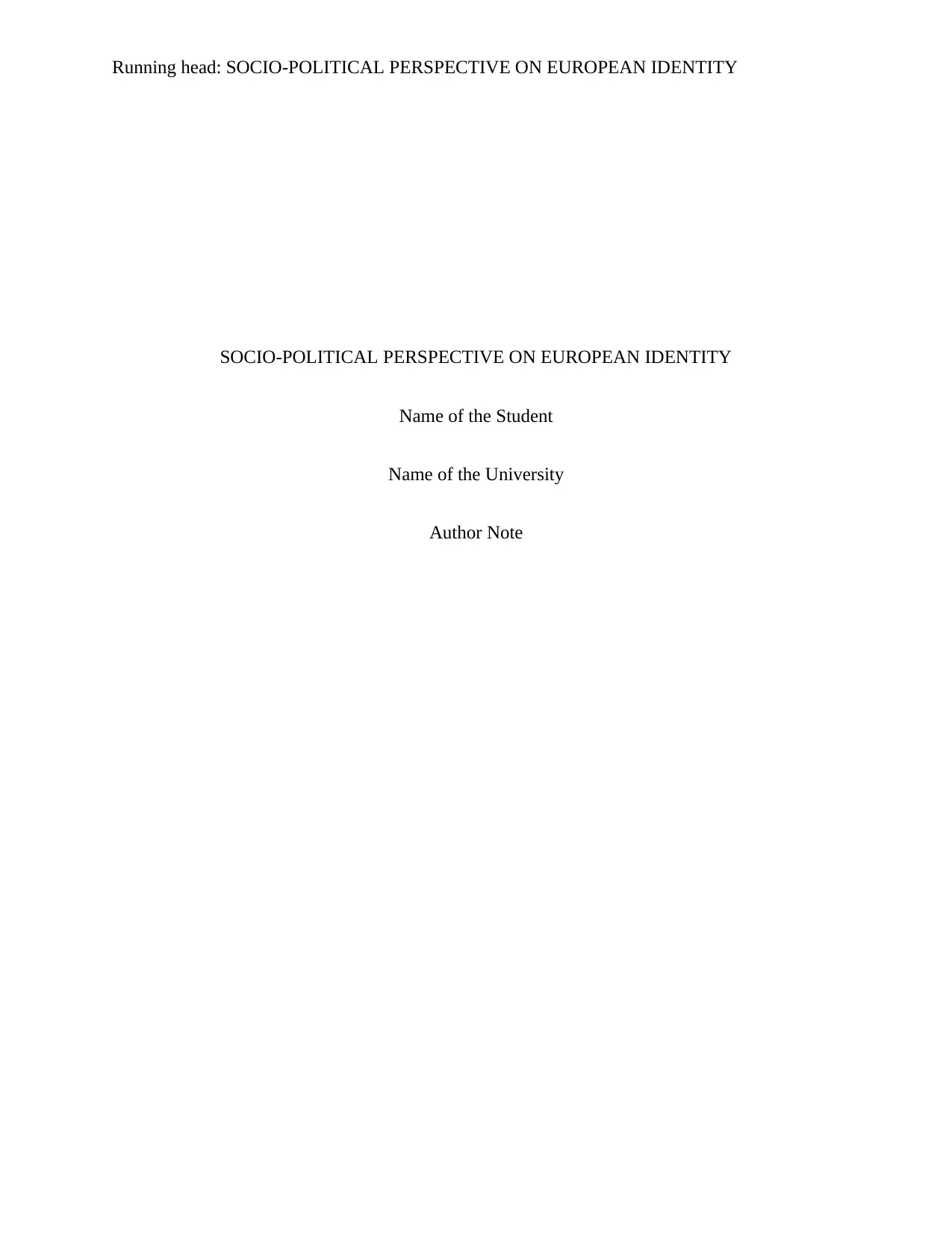
Running head: SOCIO-POLITICAL PERSPECTIVE ON EUROPEAN IDENTITY
SOCIO-POLITICAL PERSPECTIVE ON EUROPEAN IDENTITY
Name of the Student
Name of the University
Author Note
SOCIO-POLITICAL PERSPECTIVE ON EUROPEAN IDENTITY
Name of the Student
Name of the University
Author Note
Paraphrase This Document
Need a fresh take? Get an instant paraphrase of this document with our AI Paraphraser
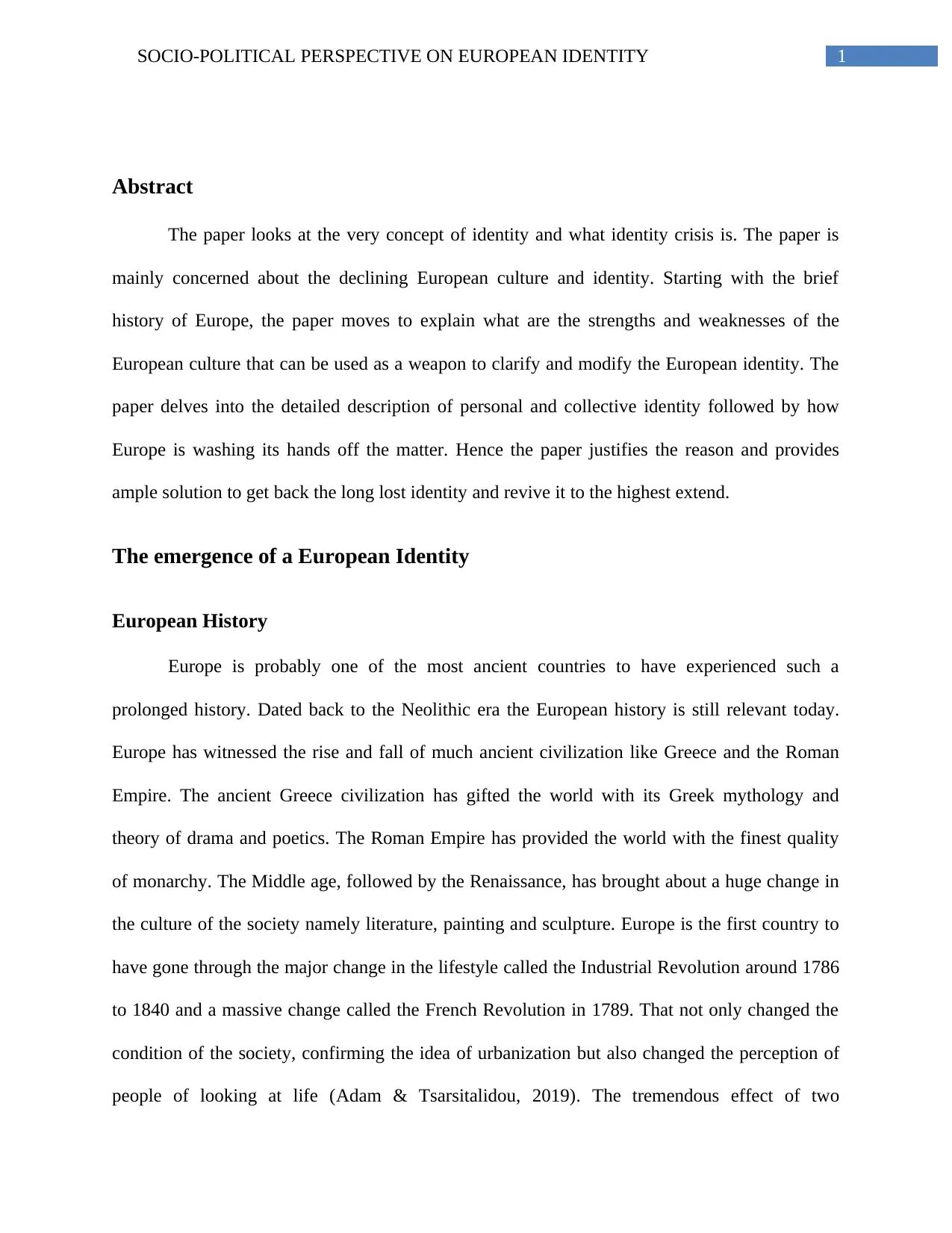
1SOCIO-POLITICAL PERSPECTIVE ON EUROPEAN IDENTITY
Abstract
The paper looks at the very concept of identity and what identity crisis is. The paper is
mainly concerned about the declining European culture and identity. Starting with the brief
history of Europe, the paper moves to explain what are the strengths and weaknesses of the
European culture that can be used as a weapon to clarify and modify the European identity. The
paper delves into the detailed description of personal and collective identity followed by how
Europe is washing its hands off the matter. Hence the paper justifies the reason and provides
ample solution to get back the long lost identity and revive it to the highest extend.
The emergence of a European Identity
European History
Europe is probably one of the most ancient countries to have experienced such a
prolonged history. Dated back to the Neolithic era the European history is still relevant today.
Europe has witnessed the rise and fall of much ancient civilization like Greece and the Roman
Empire. The ancient Greece civilization has gifted the world with its Greek mythology and
theory of drama and poetics. The Roman Empire has provided the world with the finest quality
of monarchy. The Middle age, followed by the Renaissance, has brought about a huge change in
the culture of the society namely literature, painting and sculpture. Europe is the first country to
have gone through the major change in the lifestyle called the Industrial Revolution around 1786
to 1840 and a massive change called the French Revolution in 1789. That not only changed the
condition of the society, confirming the idea of urbanization but also changed the perception of
people of looking at life (Adam & Tsarsitalidou, 2019). The tremendous effect of two
Abstract
The paper looks at the very concept of identity and what identity crisis is. The paper is
mainly concerned about the declining European culture and identity. Starting with the brief
history of Europe, the paper moves to explain what are the strengths and weaknesses of the
European culture that can be used as a weapon to clarify and modify the European identity. The
paper delves into the detailed description of personal and collective identity followed by how
Europe is washing its hands off the matter. Hence the paper justifies the reason and provides
ample solution to get back the long lost identity and revive it to the highest extend.
The emergence of a European Identity
European History
Europe is probably one of the most ancient countries to have experienced such a
prolonged history. Dated back to the Neolithic era the European history is still relevant today.
Europe has witnessed the rise and fall of much ancient civilization like Greece and the Roman
Empire. The ancient Greece civilization has gifted the world with its Greek mythology and
theory of drama and poetics. The Roman Empire has provided the world with the finest quality
of monarchy. The Middle age, followed by the Renaissance, has brought about a huge change in
the culture of the society namely literature, painting and sculpture. Europe is the first country to
have gone through the major change in the lifestyle called the Industrial Revolution around 1786
to 1840 and a massive change called the French Revolution in 1789. That not only changed the
condition of the society, confirming the idea of urbanization but also changed the perception of
people of looking at life (Adam & Tsarsitalidou, 2019). The tremendous effect of two
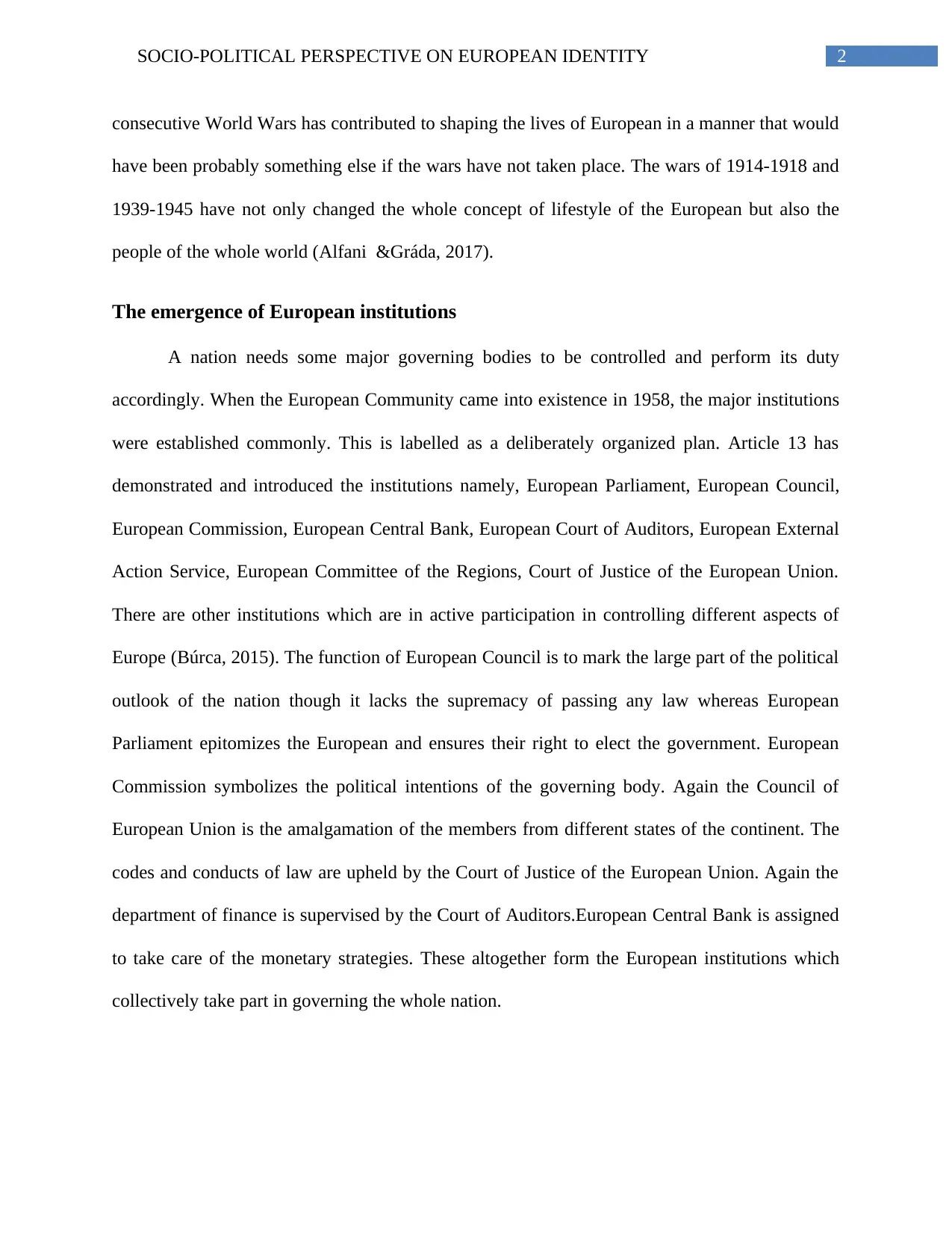
2SOCIO-POLITICAL PERSPECTIVE ON EUROPEAN IDENTITY
consecutive World Wars has contributed to shaping the lives of European in a manner that would
have been probably something else if the wars have not taken place. The wars of 1914-1918 and
1939-1945 have not only changed the whole concept of lifestyle of the European but also the
people of the whole world (Alfani &Gráda, 2017).
The emergence of European institutions
A nation needs some major governing bodies to be controlled and perform its duty
accordingly. When the European Community came into existence in 1958, the major institutions
were established commonly. This is labelled as a deliberately organized plan. Article 13 has
demonstrated and introduced the institutions namely, European Parliament, European Council,
European Commission, European Central Bank, European Court of Auditors, European External
Action Service, European Committee of the Regions, Court of Justice of the European Union.
There are other institutions which are in active participation in controlling different aspects of
Europe (Búrca, 2015). The function of European Council is to mark the large part of the political
outlook of the nation though it lacks the supremacy of passing any law whereas European
Parliament epitomizes the European and ensures their right to elect the government. European
Commission symbolizes the political intentions of the governing body. Again the Council of
European Union is the amalgamation of the members from different states of the continent. The
codes and conducts of law are upheld by the Court of Justice of the European Union. Again the
department of finance is supervised by the Court of Auditors.European Central Bank is assigned
to take care of the monetary strategies. These altogether form the European institutions which
collectively take part in governing the whole nation.
consecutive World Wars has contributed to shaping the lives of European in a manner that would
have been probably something else if the wars have not taken place. The wars of 1914-1918 and
1939-1945 have not only changed the whole concept of lifestyle of the European but also the
people of the whole world (Alfani &Gráda, 2017).
The emergence of European institutions
A nation needs some major governing bodies to be controlled and perform its duty
accordingly. When the European Community came into existence in 1958, the major institutions
were established commonly. This is labelled as a deliberately organized plan. Article 13 has
demonstrated and introduced the institutions namely, European Parliament, European Council,
European Commission, European Central Bank, European Court of Auditors, European External
Action Service, European Committee of the Regions, Court of Justice of the European Union.
There are other institutions which are in active participation in controlling different aspects of
Europe (Búrca, 2015). The function of European Council is to mark the large part of the political
outlook of the nation though it lacks the supremacy of passing any law whereas European
Parliament epitomizes the European and ensures their right to elect the government. European
Commission symbolizes the political intentions of the governing body. Again the Council of
European Union is the amalgamation of the members from different states of the continent. The
codes and conducts of law are upheld by the Court of Justice of the European Union. Again the
department of finance is supervised by the Court of Auditors.European Central Bank is assigned
to take care of the monetary strategies. These altogether form the European institutions which
collectively take part in governing the whole nation.
⊘ This is a preview!⊘
Do you want full access?
Subscribe today to unlock all pages.

Trusted by 1+ million students worldwide
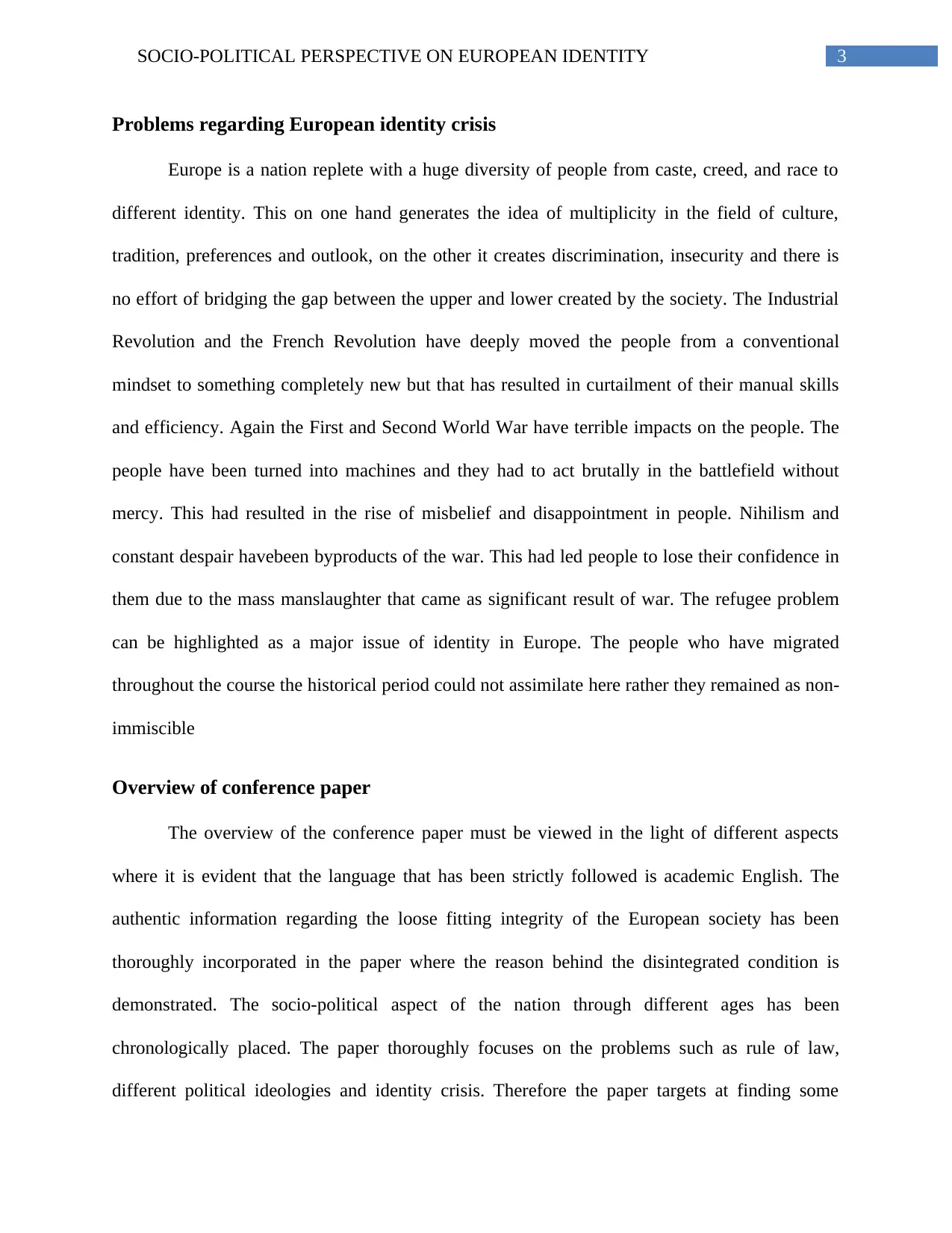
3SOCIO-POLITICAL PERSPECTIVE ON EUROPEAN IDENTITY
Problems regarding European identity crisis
Europe is a nation replete with a huge diversity of people from caste, creed, and race to
different identity. This on one hand generates the idea of multiplicity in the field of culture,
tradition, preferences and outlook, on the other it creates discrimination, insecurity and there is
no effort of bridging the gap between the upper and lower created by the society. The Industrial
Revolution and the French Revolution have deeply moved the people from a conventional
mindset to something completely new but that has resulted in curtailment of their manual skills
and efficiency. Again the First and Second World War have terrible impacts on the people. The
people have been turned into machines and they had to act brutally in the battlefield without
mercy. This had resulted in the rise of misbelief and disappointment in people. Nihilism and
constant despair havebeen byproducts of the war. This had led people to lose their confidence in
them due to the mass manslaughter that came as significant result of war. The refugee problem
can be highlighted as a major issue of identity in Europe. The people who have migrated
throughout the course the historical period could not assimilate here rather they remained as non-
immiscible
Overview of conference paper
The overview of the conference paper must be viewed in the light of different aspects
where it is evident that the language that has been strictly followed is academic English. The
authentic information regarding the loose fitting integrity of the European society has been
thoroughly incorporated in the paper where the reason behind the disintegrated condition is
demonstrated. The socio-political aspect of the nation through different ages has been
chronologically placed. The paper thoroughly focuses on the problems such as rule of law,
different political ideologies and identity crisis. Therefore the paper targets at finding some
Problems regarding European identity crisis
Europe is a nation replete with a huge diversity of people from caste, creed, and race to
different identity. This on one hand generates the idea of multiplicity in the field of culture,
tradition, preferences and outlook, on the other it creates discrimination, insecurity and there is
no effort of bridging the gap between the upper and lower created by the society. The Industrial
Revolution and the French Revolution have deeply moved the people from a conventional
mindset to something completely new but that has resulted in curtailment of their manual skills
and efficiency. Again the First and Second World War have terrible impacts on the people. The
people have been turned into machines and they had to act brutally in the battlefield without
mercy. This had resulted in the rise of misbelief and disappointment in people. Nihilism and
constant despair havebeen byproducts of the war. This had led people to lose their confidence in
them due to the mass manslaughter that came as significant result of war. The refugee problem
can be highlighted as a major issue of identity in Europe. The people who have migrated
throughout the course the historical period could not assimilate here rather they remained as non-
immiscible
Overview of conference paper
The overview of the conference paper must be viewed in the light of different aspects
where it is evident that the language that has been strictly followed is academic English. The
authentic information regarding the loose fitting integrity of the European society has been
thoroughly incorporated in the paper where the reason behind the disintegrated condition is
demonstrated. The socio-political aspect of the nation through different ages has been
chronologically placed. The paper thoroughly focuses on the problems such as rule of law,
different political ideologies and identity crisis. Therefore the paper targets at finding some
Paraphrase This Document
Need a fresh take? Get an instant paraphrase of this document with our AI Paraphraser
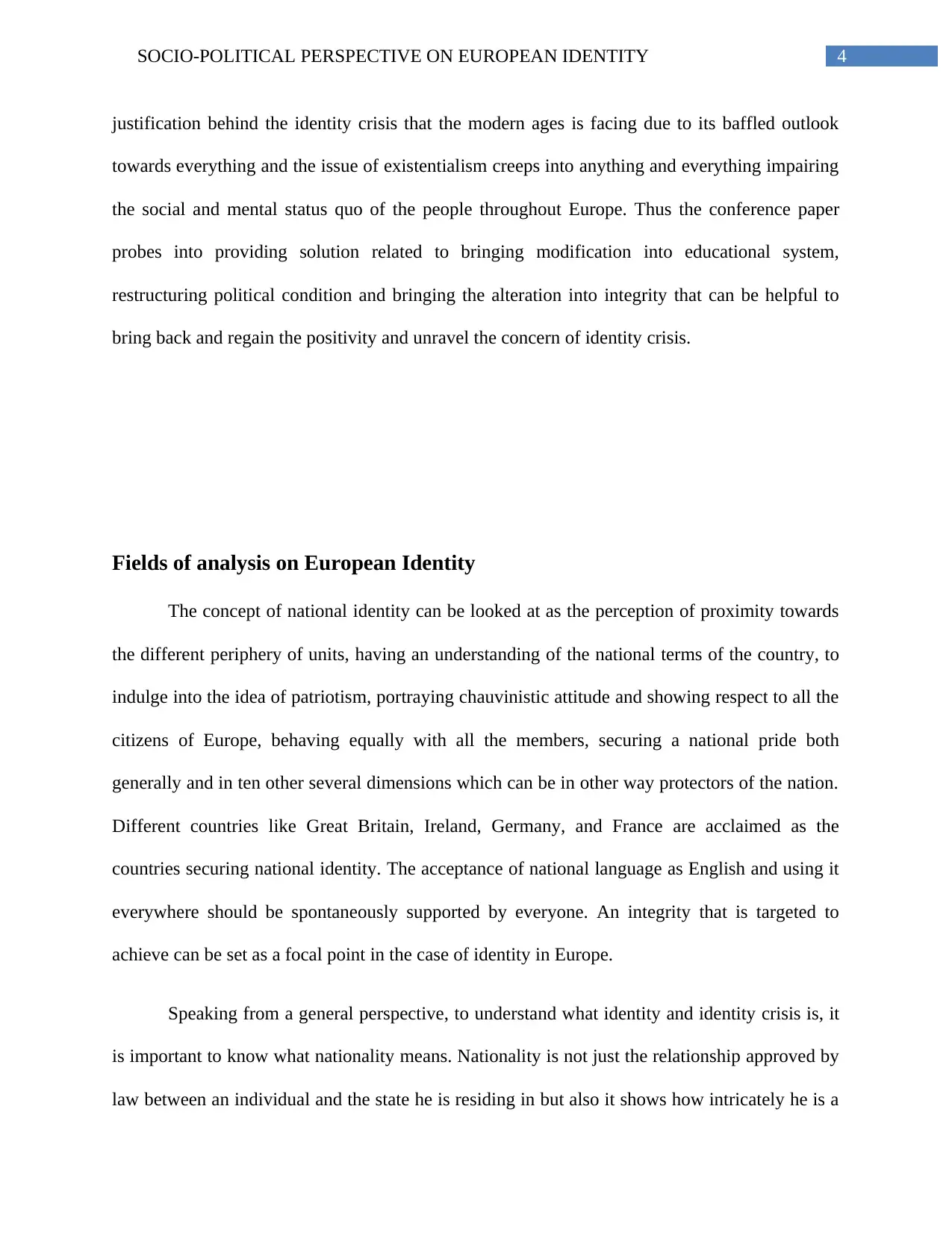
4SOCIO-POLITICAL PERSPECTIVE ON EUROPEAN IDENTITY
justification behind the identity crisis that the modern ages is facing due to its baffled outlook
towards everything and the issue of existentialism creeps into anything and everything impairing
the social and mental status quo of the people throughout Europe. Thus the conference paper
probes into providing solution related to bringing modification into educational system,
restructuring political condition and bringing the alteration into integrity that can be helpful to
bring back and regain the positivity and unravel the concern of identity crisis.
Fields of analysis on European Identity
The concept of national identity can be looked at as the perception of proximity towards
the different periphery of units, having an understanding of the national terms of the country, to
indulge into the idea of patriotism, portraying chauvinistic attitude and showing respect to all the
citizens of Europe, behaving equally with all the members, securing a national pride both
generally and in ten other several dimensions which can be in other way protectors of the nation.
Different countries like Great Britain, Ireland, Germany, and France are acclaimed as the
countries securing national identity. The acceptance of national language as English and using it
everywhere should be spontaneously supported by everyone. An integrity that is targeted to
achieve can be set as a focal point in the case of identity in Europe.
Speaking from a general perspective, to understand what identity and identity crisis is, it
is important to know what nationality means. Nationality is not just the relationship approved by
law between an individual and the state he is residing in but also it shows how intricately he is a
justification behind the identity crisis that the modern ages is facing due to its baffled outlook
towards everything and the issue of existentialism creeps into anything and everything impairing
the social and mental status quo of the people throughout Europe. Thus the conference paper
probes into providing solution related to bringing modification into educational system,
restructuring political condition and bringing the alteration into integrity that can be helpful to
bring back and regain the positivity and unravel the concern of identity crisis.
Fields of analysis on European Identity
The concept of national identity can be looked at as the perception of proximity towards
the different periphery of units, having an understanding of the national terms of the country, to
indulge into the idea of patriotism, portraying chauvinistic attitude and showing respect to all the
citizens of Europe, behaving equally with all the members, securing a national pride both
generally and in ten other several dimensions which can be in other way protectors of the nation.
Different countries like Great Britain, Ireland, Germany, and France are acclaimed as the
countries securing national identity. The acceptance of national language as English and using it
everywhere should be spontaneously supported by everyone. An integrity that is targeted to
achieve can be set as a focal point in the case of identity in Europe.
Speaking from a general perspective, to understand what identity and identity crisis is, it
is important to know what nationality means. Nationality is not just the relationship approved by
law between an individual and the state he is residing in but also it shows how intricately he is a
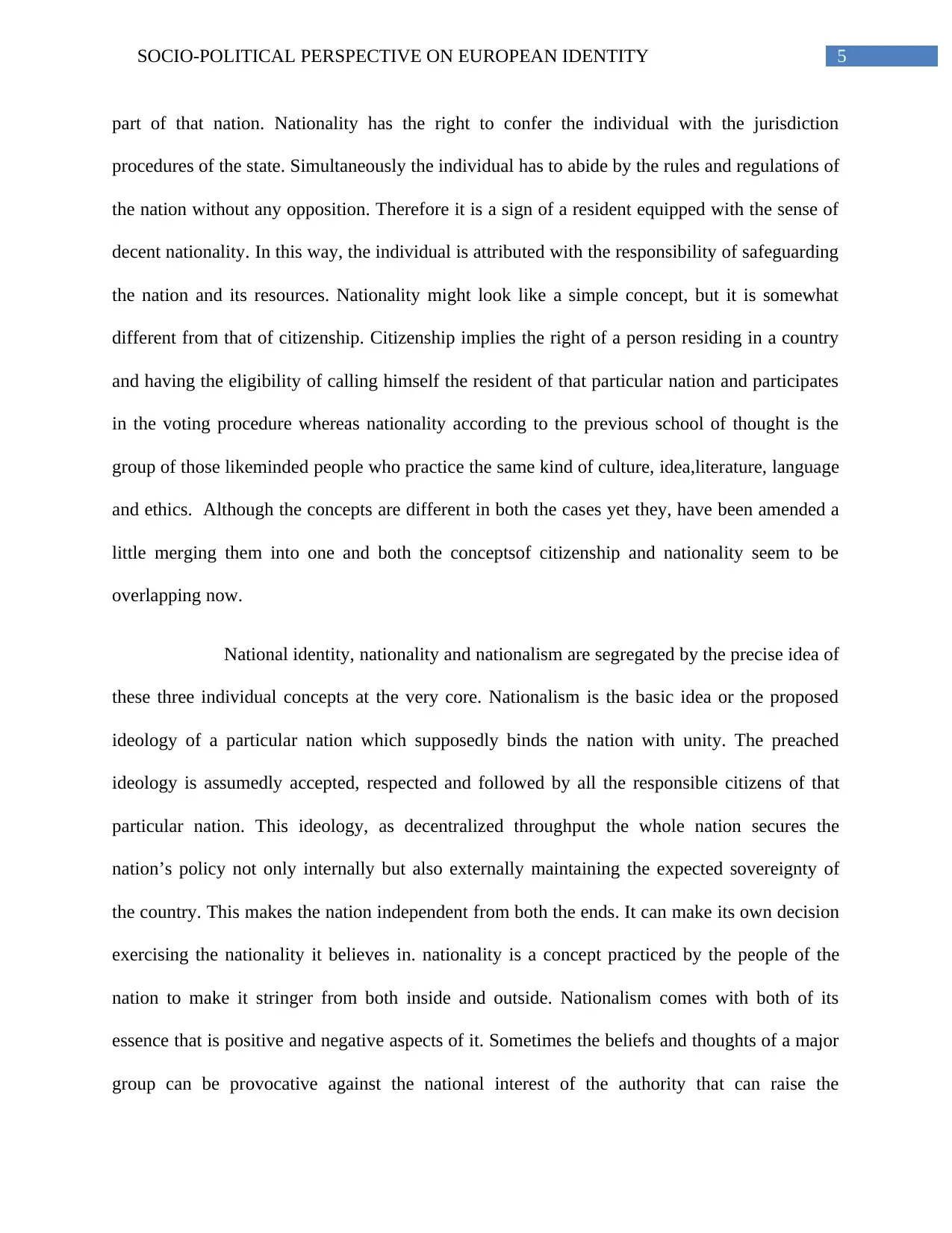
5SOCIO-POLITICAL PERSPECTIVE ON EUROPEAN IDENTITY
part of that nation. Nationality has the right to confer the individual with the jurisdiction
procedures of the state. Simultaneously the individual has to abide by the rules and regulations of
the nation without any opposition. Therefore it is a sign of a resident equipped with the sense of
decent nationality. In this way, the individual is attributed with the responsibility of safeguarding
the nation and its resources. Nationality might look like a simple concept, but it is somewhat
different from that of citizenship. Citizenship implies the right of a person residing in a country
and having the eligibility of calling himself the resident of that particular nation and participates
in the voting procedure whereas nationality according to the previous school of thought is the
group of those likeminded people who practice the same kind of culture, idea,literature, language
and ethics. Although the concepts are different in both the cases yet they, have been amended a
little merging them into one and both the conceptsof citizenship and nationality seem to be
overlapping now.
National identity, nationality and nationalism are segregated by the precise idea of
these three individual concepts at the very core. Nationalism is the basic idea or the proposed
ideology of a particular nation which supposedly binds the nation with unity. The preached
ideology is assumedly accepted, respected and followed by all the responsible citizens of that
particular nation. This ideology, as decentralized throughput the whole nation secures the
nation’s policy not only internally but also externally maintaining the expected sovereignty of
the country. This makes the nation independent from both the ends. It can make its own decision
exercising the nationality it believes in. nationality is a concept practiced by the people of the
nation to make it stringer from both inside and outside. Nationalism comes with both of its
essence that is positive and negative aspects of it. Sometimes the beliefs and thoughts of a major
group can be provocative against the national interest of the authority that can raise the
part of that nation. Nationality has the right to confer the individual with the jurisdiction
procedures of the state. Simultaneously the individual has to abide by the rules and regulations of
the nation without any opposition. Therefore it is a sign of a resident equipped with the sense of
decent nationality. In this way, the individual is attributed with the responsibility of safeguarding
the nation and its resources. Nationality might look like a simple concept, but it is somewhat
different from that of citizenship. Citizenship implies the right of a person residing in a country
and having the eligibility of calling himself the resident of that particular nation and participates
in the voting procedure whereas nationality according to the previous school of thought is the
group of those likeminded people who practice the same kind of culture, idea,literature, language
and ethics. Although the concepts are different in both the cases yet they, have been amended a
little merging them into one and both the conceptsof citizenship and nationality seem to be
overlapping now.
National identity, nationality and nationalism are segregated by the precise idea of
these three individual concepts at the very core. Nationalism is the basic idea or the proposed
ideology of a particular nation which supposedly binds the nation with unity. The preached
ideology is assumedly accepted, respected and followed by all the responsible citizens of that
particular nation. This ideology, as decentralized throughput the whole nation secures the
nation’s policy not only internally but also externally maintaining the expected sovereignty of
the country. This makes the nation independent from both the ends. It can make its own decision
exercising the nationality it believes in. nationality is a concept practiced by the people of the
nation to make it stringer from both inside and outside. Nationalism comes with both of its
essence that is positive and negative aspects of it. Sometimes the beliefs and thoughts of a major
group can be provocative against the national interest of the authority that can raise the
⊘ This is a preview!⊘
Do you want full access?
Subscribe today to unlock all pages.

Trusted by 1+ million students worldwide
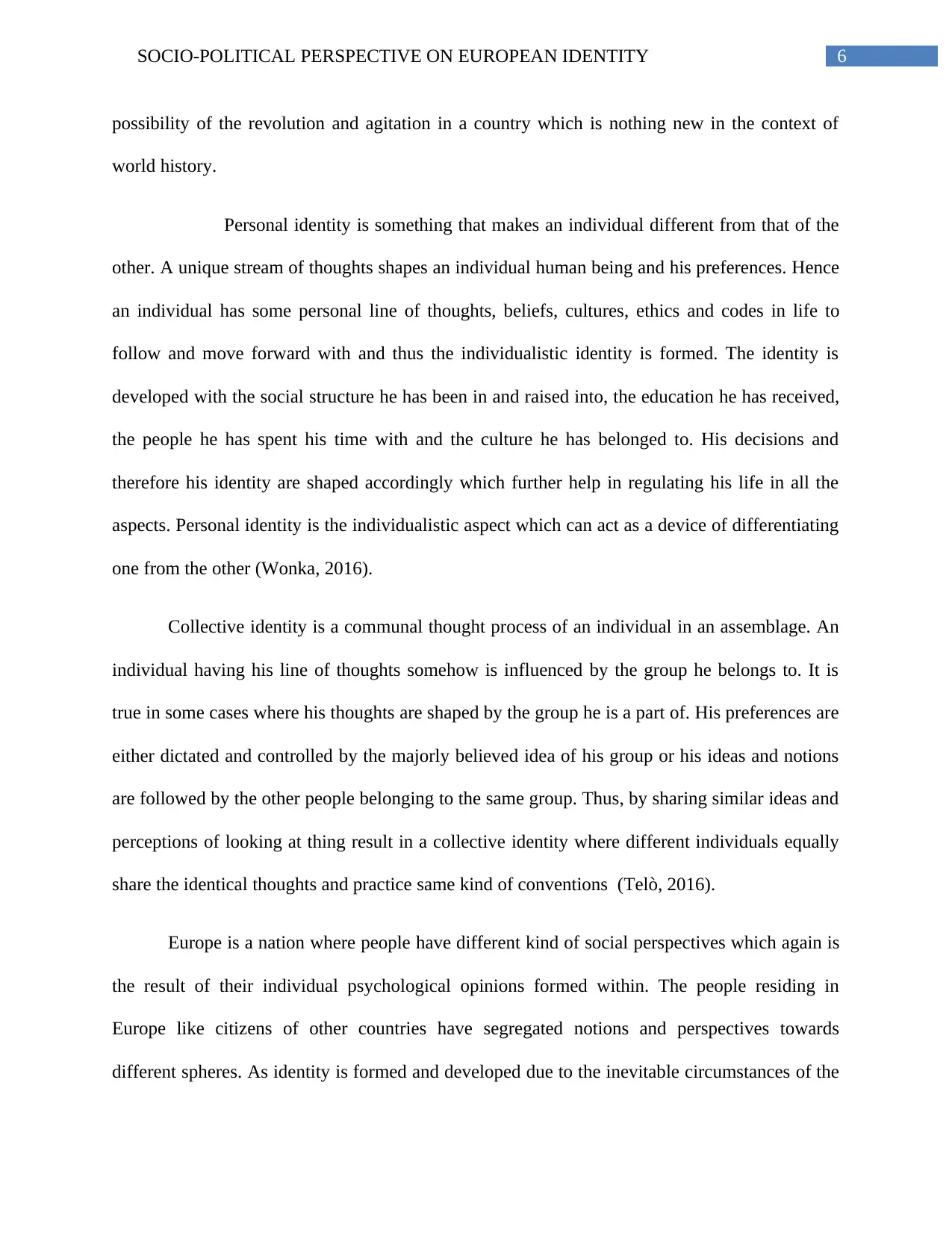
6SOCIO-POLITICAL PERSPECTIVE ON EUROPEAN IDENTITY
possibility of the revolution and agitation in a country which is nothing new in the context of
world history.
Personal identity is something that makes an individual different from that of the
other. A unique stream of thoughts shapes an individual human being and his preferences. Hence
an individual has some personal line of thoughts, beliefs, cultures, ethics and codes in life to
follow and move forward with and thus the individualistic identity is formed. The identity is
developed with the social structure he has been in and raised into, the education he has received,
the people he has spent his time with and the culture he has belonged to. His decisions and
therefore his identity are shaped accordingly which further help in regulating his life in all the
aspects. Personal identity is the individualistic aspect which can act as a device of differentiating
one from the other (Wonka, 2016).
Collective identity is a communal thought process of an individual in an assemblage. An
individual having his line of thoughts somehow is influenced by the group he belongs to. It is
true in some cases where his thoughts are shaped by the group he is a part of. His preferences are
either dictated and controlled by the majorly believed idea of his group or his ideas and notions
are followed by the other people belonging to the same group. Thus, by sharing similar ideas and
perceptions of looking at thing result in a collective identity where different individuals equally
share the identical thoughts and practice same kind of conventions (Telò, 2016).
Europe is a nation where people have different kind of social perspectives which again is
the result of their individual psychological opinions formed within. The people residing in
Europe like citizens of other countries have segregated notions and perspectives towards
different spheres. As identity is formed and developed due to the inevitable circumstances of the
possibility of the revolution and agitation in a country which is nothing new in the context of
world history.
Personal identity is something that makes an individual different from that of the
other. A unique stream of thoughts shapes an individual human being and his preferences. Hence
an individual has some personal line of thoughts, beliefs, cultures, ethics and codes in life to
follow and move forward with and thus the individualistic identity is formed. The identity is
developed with the social structure he has been in and raised into, the education he has received,
the people he has spent his time with and the culture he has belonged to. His decisions and
therefore his identity are shaped accordingly which further help in regulating his life in all the
aspects. Personal identity is the individualistic aspect which can act as a device of differentiating
one from the other (Wonka, 2016).
Collective identity is a communal thought process of an individual in an assemblage. An
individual having his line of thoughts somehow is influenced by the group he belongs to. It is
true in some cases where his thoughts are shaped by the group he is a part of. His preferences are
either dictated and controlled by the majorly believed idea of his group or his ideas and notions
are followed by the other people belonging to the same group. Thus, by sharing similar ideas and
perceptions of looking at thing result in a collective identity where different individuals equally
share the identical thoughts and practice same kind of conventions (Telò, 2016).
Europe is a nation where people have different kind of social perspectives which again is
the result of their individual psychological opinions formed within. The people residing in
Europe like citizens of other countries have segregated notions and perspectives towards
different spheres. As identity is formed and developed due to the inevitable circumstances of the
Paraphrase This Document
Need a fresh take? Get an instant paraphrase of this document with our AI Paraphraser
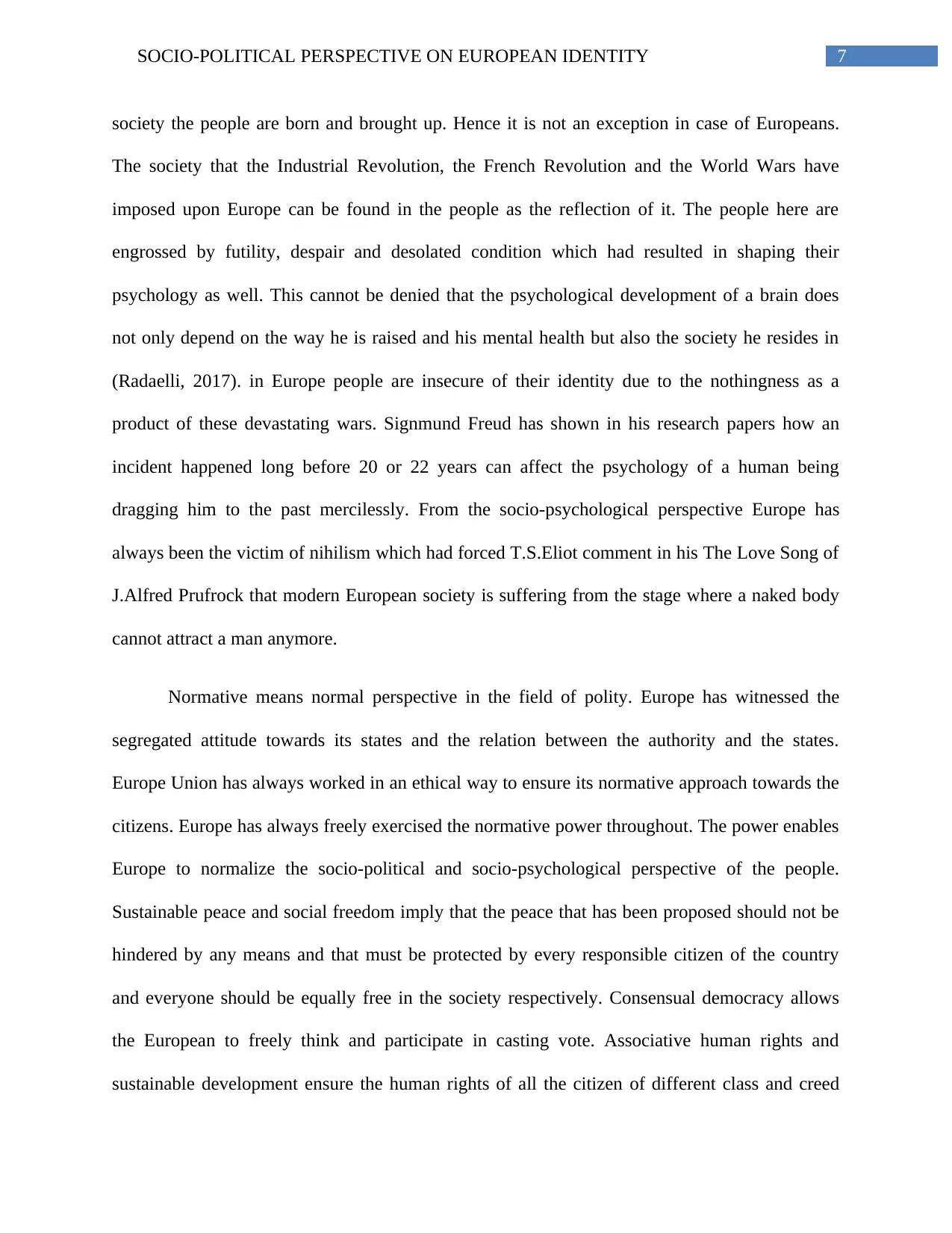
7SOCIO-POLITICAL PERSPECTIVE ON EUROPEAN IDENTITY
society the people are born and brought up. Hence it is not an exception in case of Europeans.
The society that the Industrial Revolution, the French Revolution and the World Wars have
imposed upon Europe can be found in the people as the reflection of it. The people here are
engrossed by futility, despair and desolated condition which had resulted in shaping their
psychology as well. This cannot be denied that the psychological development of a brain does
not only depend on the way he is raised and his mental health but also the society he resides in
(Radaelli, 2017). in Europe people are insecure of their identity due to the nothingness as a
product of these devastating wars. Signmund Freud has shown in his research papers how an
incident happened long before 20 or 22 years can affect the psychology of a human being
dragging him to the past mercilessly. From the socio-psychological perspective Europe has
always been the victim of nihilism which had forced T.S.Eliot comment in his The Love Song of
J.Alfred Prufrock that modern European society is suffering from the stage where a naked body
cannot attract a man anymore.
Normative means normal perspective in the field of polity. Europe has witnessed the
segregated attitude towards its states and the relation between the authority and the states.
Europe Union has always worked in an ethical way to ensure its normative approach towards the
citizens. Europe has always freely exercised the normative power throughout. The power enables
Europe to normalize the socio-political and socio-psychological perspective of the people.
Sustainable peace and social freedom imply that the peace that has been proposed should not be
hindered by any means and that must be protected by every responsible citizen of the country
and everyone should be equally free in the society respectively. Consensual democracy allows
the European to freely think and participate in casting vote. Associative human rights and
sustainable development ensure the human rights of all the citizen of different class and creed
society the people are born and brought up. Hence it is not an exception in case of Europeans.
The society that the Industrial Revolution, the French Revolution and the World Wars have
imposed upon Europe can be found in the people as the reflection of it. The people here are
engrossed by futility, despair and desolated condition which had resulted in shaping their
psychology as well. This cannot be denied that the psychological development of a brain does
not only depend on the way he is raised and his mental health but also the society he resides in
(Radaelli, 2017). in Europe people are insecure of their identity due to the nothingness as a
product of these devastating wars. Signmund Freud has shown in his research papers how an
incident happened long before 20 or 22 years can affect the psychology of a human being
dragging him to the past mercilessly. From the socio-psychological perspective Europe has
always been the victim of nihilism which had forced T.S.Eliot comment in his The Love Song of
J.Alfred Prufrock that modern European society is suffering from the stage where a naked body
cannot attract a man anymore.
Normative means normal perspective in the field of polity. Europe has witnessed the
segregated attitude towards its states and the relation between the authority and the states.
Europe Union has always worked in an ethical way to ensure its normative approach towards the
citizens. Europe has always freely exercised the normative power throughout. The power enables
Europe to normalize the socio-political and socio-psychological perspective of the people.
Sustainable peace and social freedom imply that the peace that has been proposed should not be
hindered by any means and that must be protected by every responsible citizen of the country
and everyone should be equally free in the society respectively. Consensual democracy allows
the European to freely think and participate in casting vote. Associative human rights and
sustainable development ensure the human rights of all the citizen of different class and creed
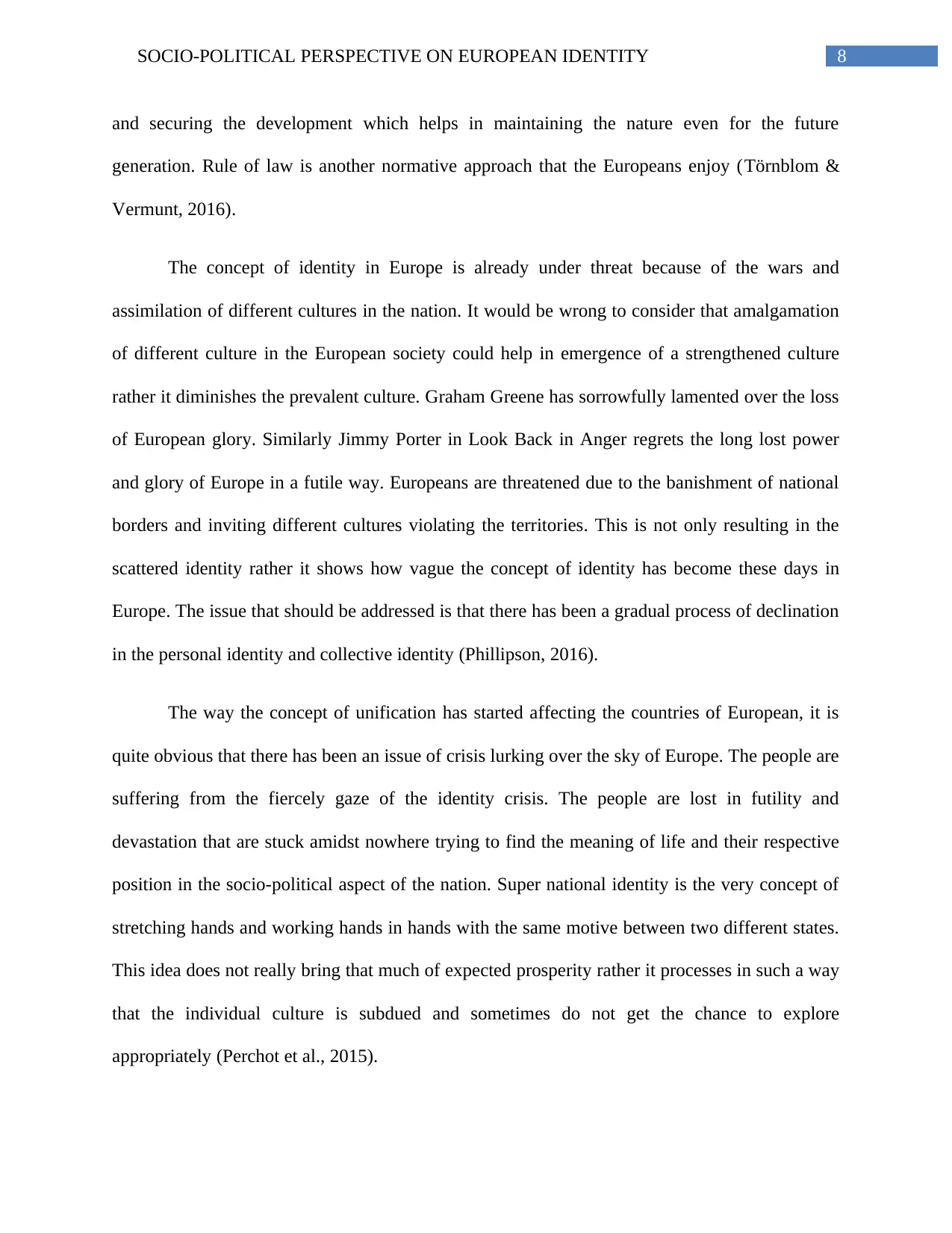
8SOCIO-POLITICAL PERSPECTIVE ON EUROPEAN IDENTITY
and securing the development which helps in maintaining the nature even for the future
generation. Rule of law is another normative approach that the Europeans enjoy (Törnblom &
Vermunt, 2016).
The concept of identity in Europe is already under threat because of the wars and
assimilation of different cultures in the nation. It would be wrong to consider that amalgamation
of different culture in the European society could help in emergence of a strengthened culture
rather it diminishes the prevalent culture. Graham Greene has sorrowfully lamented over the loss
of European glory. Similarly Jimmy Porter in Look Back in Anger regrets the long lost power
and glory of Europe in a futile way. Europeans are threatened due to the banishment of national
borders and inviting different cultures violating the territories. This is not only resulting in the
scattered identity rather it shows how vague the concept of identity has become these days in
Europe. The issue that should be addressed is that there has been a gradual process of declination
in the personal identity and collective identity (Phillipson, 2016).
The way the concept of unification has started affecting the countries of European, it is
quite obvious that there has been an issue of crisis lurking over the sky of Europe. The people are
suffering from the fiercely gaze of the identity crisis. The people are lost in futility and
devastation that are stuck amidst nowhere trying to find the meaning of life and their respective
position in the socio-political aspect of the nation. Super national identity is the very concept of
stretching hands and working hands in hands with the same motive between two different states.
This idea does not really bring that much of expected prosperity rather it processes in such a way
that the individual culture is subdued and sometimes do not get the chance to explore
appropriately (Perchot et al., 2015).
and securing the development which helps in maintaining the nature even for the future
generation. Rule of law is another normative approach that the Europeans enjoy (Törnblom &
Vermunt, 2016).
The concept of identity in Europe is already under threat because of the wars and
assimilation of different cultures in the nation. It would be wrong to consider that amalgamation
of different culture in the European society could help in emergence of a strengthened culture
rather it diminishes the prevalent culture. Graham Greene has sorrowfully lamented over the loss
of European glory. Similarly Jimmy Porter in Look Back in Anger regrets the long lost power
and glory of Europe in a futile way. Europeans are threatened due to the banishment of national
borders and inviting different cultures violating the territories. This is not only resulting in the
scattered identity rather it shows how vague the concept of identity has become these days in
Europe. The issue that should be addressed is that there has been a gradual process of declination
in the personal identity and collective identity (Phillipson, 2016).
The way the concept of unification has started affecting the countries of European, it is
quite obvious that there has been an issue of crisis lurking over the sky of Europe. The people are
suffering from the fiercely gaze of the identity crisis. The people are lost in futility and
devastation that are stuck amidst nowhere trying to find the meaning of life and their respective
position in the socio-political aspect of the nation. Super national identity is the very concept of
stretching hands and working hands in hands with the same motive between two different states.
This idea does not really bring that much of expected prosperity rather it processes in such a way
that the individual culture is subdued and sometimes do not get the chance to explore
appropriately (Perchot et al., 2015).
⊘ This is a preview!⊘
Do you want full access?
Subscribe today to unlock all pages.

Trusted by 1+ million students worldwide
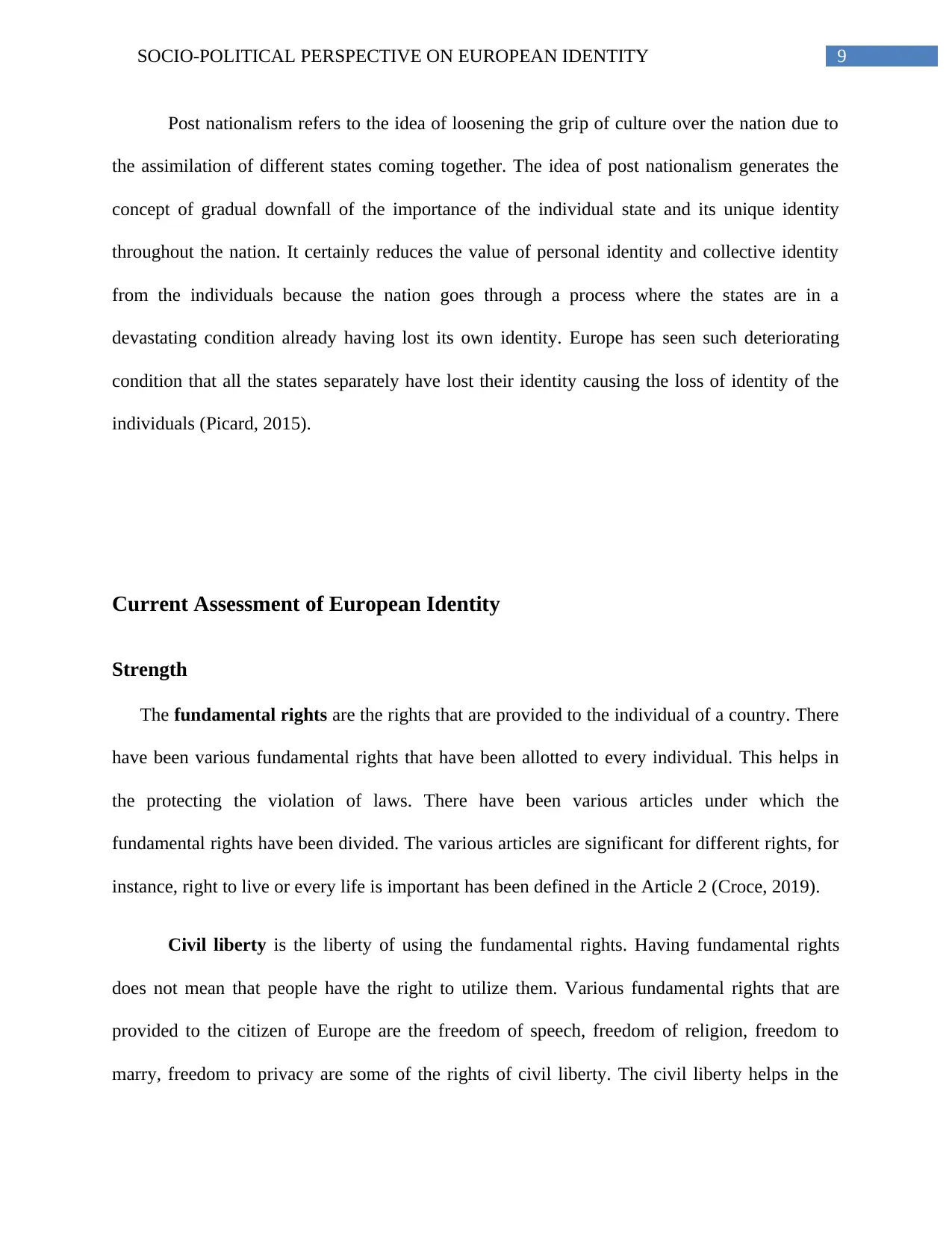
9SOCIO-POLITICAL PERSPECTIVE ON EUROPEAN IDENTITY
Post nationalism refers to the idea of loosening the grip of culture over the nation due to
the assimilation of different states coming together. The idea of post nationalism generates the
concept of gradual downfall of the importance of the individual state and its unique identity
throughout the nation. It certainly reduces the value of personal identity and collective identity
from the individuals because the nation goes through a process where the states are in a
devastating condition already having lost its own identity. Europe has seen such deteriorating
condition that all the states separately have lost their identity causing the loss of identity of the
individuals (Picard, 2015).
Current Assessment of European Identity
Strength
The fundamental rights are the rights that are provided to the individual of a country. There
have been various fundamental rights that have been allotted to every individual. This helps in
the protecting the violation of laws. There have been various articles under which the
fundamental rights have been divided. The various articles are significant for different rights, for
instance, right to live or every life is important has been defined in the Article 2 (Croce, 2019).
Civil liberty is the liberty of using the fundamental rights. Having fundamental rights
does not mean that people have the right to utilize them. Various fundamental rights that are
provided to the citizen of Europe are the freedom of speech, freedom of religion, freedom to
marry, freedom to privacy are some of the rights of civil liberty. The civil liberty helps in the
Post nationalism refers to the idea of loosening the grip of culture over the nation due to
the assimilation of different states coming together. The idea of post nationalism generates the
concept of gradual downfall of the importance of the individual state and its unique identity
throughout the nation. It certainly reduces the value of personal identity and collective identity
from the individuals because the nation goes through a process where the states are in a
devastating condition already having lost its own identity. Europe has seen such deteriorating
condition that all the states separately have lost their identity causing the loss of identity of the
individuals (Picard, 2015).
Current Assessment of European Identity
Strength
The fundamental rights are the rights that are provided to the individual of a country. There
have been various fundamental rights that have been allotted to every individual. This helps in
the protecting the violation of laws. There have been various articles under which the
fundamental rights have been divided. The various articles are significant for different rights, for
instance, right to live or every life is important has been defined in the Article 2 (Croce, 2019).
Civil liberty is the liberty of using the fundamental rights. Having fundamental rights
does not mean that people have the right to utilize them. Various fundamental rights that are
provided to the citizen of Europe are the freedom of speech, freedom of religion, freedom to
marry, freedom to privacy are some of the rights of civil liberty. The civil liberty helps in the
Paraphrase This Document
Need a fresh take? Get an instant paraphrase of this document with our AI Paraphraser
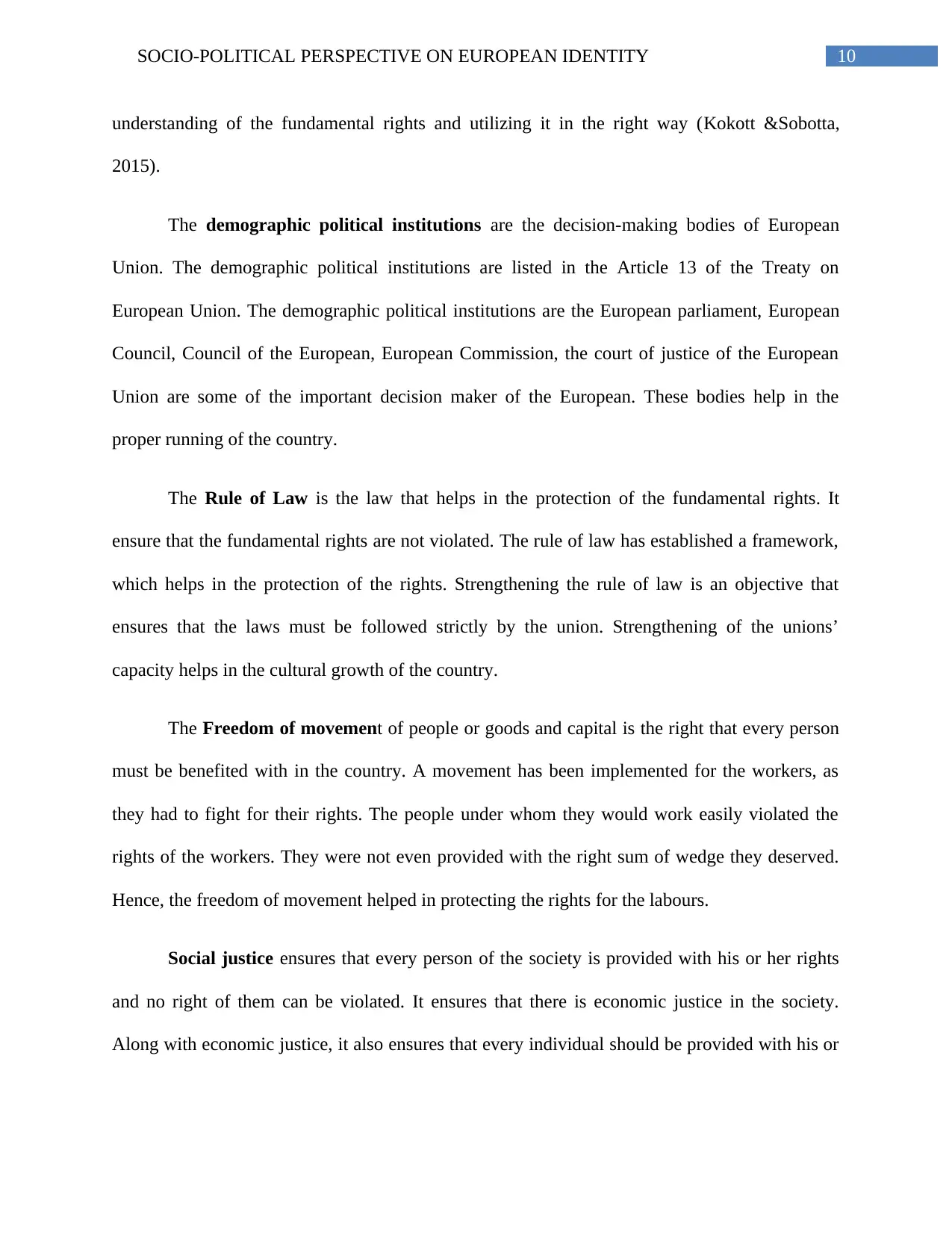
10SOCIO-POLITICAL PERSPECTIVE ON EUROPEAN IDENTITY
understanding of the fundamental rights and utilizing it in the right way (Kokott &Sobotta,
2015).
The demographic political institutions are the decision-making bodies of European
Union. The demographic political institutions are listed in the Article 13 of the Treaty on
European Union. The demographic political institutions are the European parliament, European
Council, Council of the European, European Commission, the court of justice of the European
Union are some of the important decision maker of the European. These bodies help in the
proper running of the country.
The Rule of Law is the law that helps in the protection of the fundamental rights. It
ensure that the fundamental rights are not violated. The rule of law has established a framework,
which helps in the protection of the rights. Strengthening the rule of law is an objective that
ensures that the laws must be followed strictly by the union. Strengthening of the unions’
capacity helps in the cultural growth of the country.
The Freedom of movement of people or goods and capital is the right that every person
must be benefited with in the country. A movement has been implemented for the workers, as
they had to fight for their rights. The people under whom they would work easily violated the
rights of the workers. They were not even provided with the right sum of wedge they deserved.
Hence, the freedom of movement helped in protecting the rights for the labours.
Social justice ensures that every person of the society is provided with his or her rights
and no right of them can be violated. It ensures that there is economic justice in the society.
Along with economic justice, it also ensures that every individual should be provided with his or
understanding of the fundamental rights and utilizing it in the right way (Kokott &Sobotta,
2015).
The demographic political institutions are the decision-making bodies of European
Union. The demographic political institutions are listed in the Article 13 of the Treaty on
European Union. The demographic political institutions are the European parliament, European
Council, Council of the European, European Commission, the court of justice of the European
Union are some of the important decision maker of the European. These bodies help in the
proper running of the country.
The Rule of Law is the law that helps in the protection of the fundamental rights. It
ensure that the fundamental rights are not violated. The rule of law has established a framework,
which helps in the protection of the rights. Strengthening the rule of law is an objective that
ensures that the laws must be followed strictly by the union. Strengthening of the unions’
capacity helps in the cultural growth of the country.
The Freedom of movement of people or goods and capital is the right that every person
must be benefited with in the country. A movement has been implemented for the workers, as
they had to fight for their rights. The people under whom they would work easily violated the
rights of the workers. They were not even provided with the right sum of wedge they deserved.
Hence, the freedom of movement helped in protecting the rights for the labours.
Social justice ensures that every person of the society is provided with his or her rights
and no right of them can be violated. It ensures that there is economic justice in the society.
Along with economic justice, it also ensures that every individual should be provided with his or

11SOCIO-POLITICAL PERSPECTIVE ON EUROPEAN IDENTITY
her daily necessity. In other words, we can say that the social justice provides security to the
individual for living a health life in a society (Masing, 2016).
Non-violent resolution of conflicts is the policy that has been developed to maintain a healthy
and friendly environment in workplace. This helps in the understanding of the process of the
working of an organization. This ensures every employee is treated equally and there must be
fair means of work provided to every person. It also provides the ways in which conflicts in
workplace can be resolved or the ways that will never arise in conflict (Duranti, 2016).
Unity in diversity has been developed for creating diversity in the country. It is the motto of
European Union. It has been developed in the year 2000. With unity in diversity, European
Union wants to portray that with the increase in the unity there will also be increase in the
diversity or the culture of the country. It enriches the culture, tradition and language of the
country (Ferrín &Kriesi, 2016).
Weakness
The democratic deficit is a common issue for every country that needs to be addressed in
term to the overall progress of the country. Critics have identified the fact that European
democracy features ‘undemocratic’ nature. Commission of European country is not elected
however; it is entirely answerable to the parliament of Europe. All the members of European
parliament signified in the assembly of the minister (Olsen & McCormick, 2018).
Research also identified with some cultural integration in the nature of European
Democracy. As the decision-making body, comprise the members of the technocratic group,
her daily necessity. In other words, we can say that the social justice provides security to the
individual for living a health life in a society (Masing, 2016).
Non-violent resolution of conflicts is the policy that has been developed to maintain a healthy
and friendly environment in workplace. This helps in the understanding of the process of the
working of an organization. This ensures every employee is treated equally and there must be
fair means of work provided to every person. It also provides the ways in which conflicts in
workplace can be resolved or the ways that will never arise in conflict (Duranti, 2016).
Unity in diversity has been developed for creating diversity in the country. It is the motto of
European Union. It has been developed in the year 2000. With unity in diversity, European
Union wants to portray that with the increase in the unity there will also be increase in the
diversity or the culture of the country. It enriches the culture, tradition and language of the
country (Ferrín &Kriesi, 2016).
Weakness
The democratic deficit is a common issue for every country that needs to be addressed in
term to the overall progress of the country. Critics have identified the fact that European
democracy features ‘undemocratic’ nature. Commission of European country is not elected
however; it is entirely answerable to the parliament of Europe. All the members of European
parliament signified in the assembly of the minister (Olsen & McCormick, 2018).
Research also identified with some cultural integration in the nature of European
Democracy. As the decision-making body, comprise the members of the technocratic group,
⊘ This is a preview!⊘
Do you want full access?
Subscribe today to unlock all pages.

Trusted by 1+ million students worldwide
1 out of 18
Related Documents
Your All-in-One AI-Powered Toolkit for Academic Success.
+13062052269
info@desklib.com
Available 24*7 on WhatsApp / Email
![[object Object]](/_next/static/media/star-bottom.7253800d.svg)
Unlock your academic potential
Copyright © 2020–2026 A2Z Services. All Rights Reserved. Developed and managed by ZUCOL.





